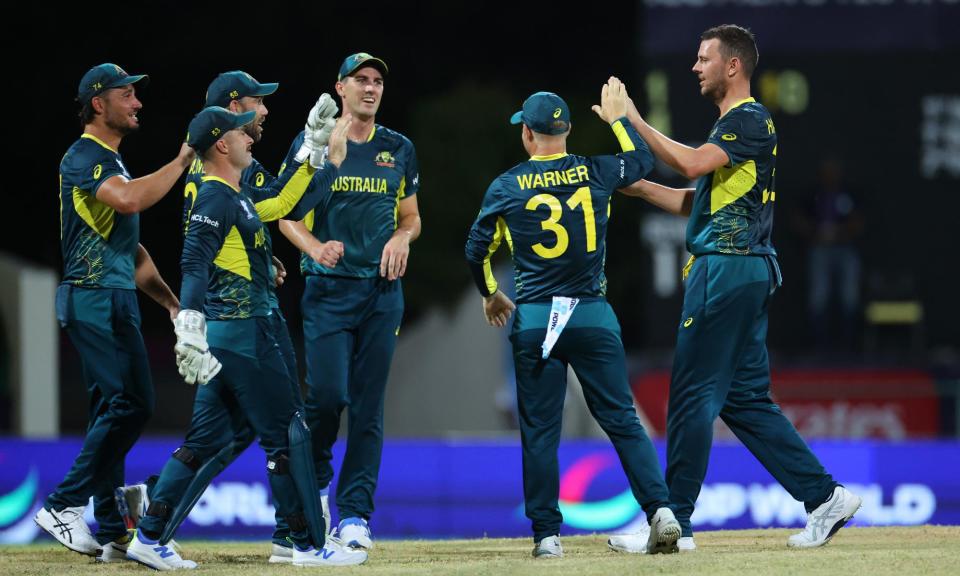Australia are the team to beat as they lay siege to T20 World Cup title

If we’re blunt, it’s easy to see why modern cricketing countries hate Australia. Or at least why they resent Australia. Beyond anything about historical disagreements or abrasiveness that observers could reasonably cite, one part has nothing to do with personality. However pleasant the individual players, it must eventually be impossible not to be fed up with a team that among such a small pool of contenders keeps winning such a disproportionate amount of the time.
In the current T20 World Cup, Pakistan lost to the United States of America and battled to a win against Canada. The tier-down Canadians beat the Test-qualified Irish. England got rained off against Scotland and were probably lucky to share the points. South Africa nearly lost to the Dutch for the third world tournament in a row. New Zealand got annihilated by Afghanistan, and still sit in their group behind Uganda, who beat a much more established team in Papua New Guinea. Former champions Sri Lanka are already knocked out, winless at the bottom of their group behind Netherlands and Nepal.
Related: ‘Getting England out of the World Cup is in Australia’s best interest’ – Hazlewood
It has been hard work for everyone against lower ranked opponents at this World Cup. Everyone except Australia, who were half held by Oman for 14 overs, then shrugged them off with increasing ease. Against Namibia, a proper side that beat Oman and challenged the Scots, Australia inflicted a loss even more one-way than some of Uganda’s.
Pakistan rested Shaheen Afridi against their North American opponents, but Australia rested their own attack leader Mitchell Starc against Namibia. His express pace left-arm swing for the opening over was replaced by some right-arm mediums from Marcus Stoinis. It didn’t matter. Josh Hazlewood stepped up to remove both openers caught in the gully, while Pat Cummins bowled first change and drew a catch from the number three. Just like a normal Test morning.
Bench seamer Nathan Ellis got the next. Lone specialist spinner Adam Zampa’s 4 for 12 showed his full range, deceiving players for catches, sliding the ball on for an lbw, and ripping a googly back through the gate to hit the stumps. And not to leave anyone out, after Namibian captain Gerhard Erasmus played a lone counterattack for three overs, Stoinis picked up the last two.
Erasmus finished with 36, Michael van Lingen had made 10, and the rest got single figures. All out 72 in 17 overs, and where other teams may have been cautious having not yet batted in Antigua, David Warner and Travis Head mowed most of that down in an instant, Mitchell Marsh helping finish it in 34 balls.
Related: The Spin | What will be the legacy of Cricket World Cup’s New York adventure?
All up, it was a rudely breezy affair that takes Australia to the next round with a game to spare, three from three. This too in 20-over cricket, which to date has been the nation’s least convincing format, the only format where it doesn’t boast a positive win-loss record against every side. So far in all T20 cricket Australia trails India 11-19, Pakistan 11-12, and is level with England and West Indies 11-11. But it doesn’t look that way right at the moment.
If anyone needed one last layer of reason to be rankled, there is the current breathless reporting about Josh Hazlewood’s comments about whether Australia might game their contest with Scotland, given that a healthy Scottish net run rate might deny England a chance to reach the next stage.
In truth, though, what he said was innocuous. Hazlewood was asked a question and answered it. He said that England not being there would make things safer for Australia, he speculated about whether scoring slowly could achieve that, and he finished by saying that it wasn’t good to get too cute in international matches, and that winning as well as possible would probably be the best option. Having a bit of fun with the idea is not the same as laying down a tactical manifesto.
In any case, that scenario may not even come to pass. The Super Eight stage could involve Scotland or England. It could involve the United States of America, it is likely to involve Afghanistan, it should involve either the Netherlands or Bangladesh. The smaller names in the game are making themselves heard but the Australians have so far sent a message of their own.

 Yahoo Sport
Yahoo Sport 






































